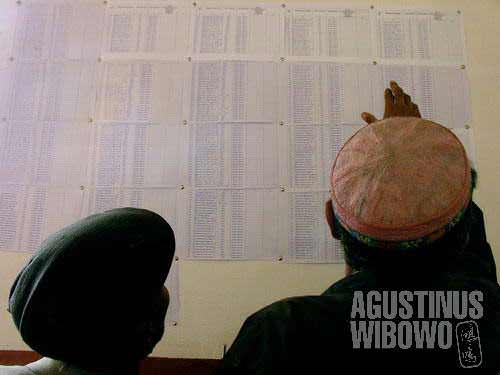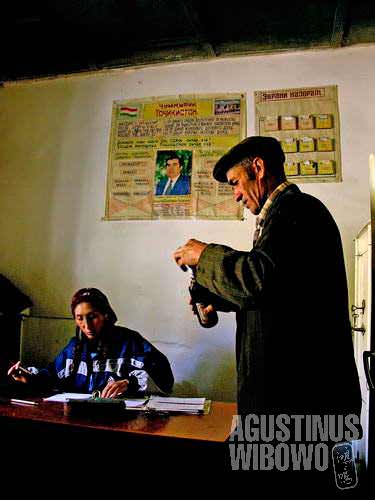Murgab – 100 Questions and Answers about Tajik Presidential Election

Browsing through the list of candidates
A friend of mine, Rosalina Tobing, works in social political section of the Embassy of Republic of Indonesia in Tashkent, Uzbekistan. She often gets assignments to make reports about political moments in Central Asia.
These days, the thing which people in Tajikistan like to talk about was the presidential election which is going to happen on November 6, 2006. Besides of this, people in GBAO also like to know more about the spiritual leader Aga Khan who visit the area together with the president. Rosalina asked me to get a book for our embassy’s reference, entitled ‘100 Questions and Answers about Tajikistan Presidential Election”. The book is as mythical as the 1001 Nights. I couldn’t find anywhere in Tajikistan (maybe because I always bumped into wrong places all time) but in election booths in the villages in GBAO.
First I saw the book in the community hall , which was magically turned to be an election booth, in Vrang. I tried to ask permission to photocopy it, but the chief of election committee said there was no photocopy machine at all in the village. When I started to take photos of the book with my digital camera, they started to suspect me as a spy. I was taken to the village chief’s room. The village leader was luckily sister of the owner of the house where I was staying. She called to Ishkashim to ask permission of giving me the book, but the district election committee in Ishkashim said unless I had permission from Dushanbe it was forbidden even to photocopy it.
The next time I saw the book was in Langar. Again, in this village there was no photocopy machine, so I didn’t bother even to ask. In Murghab I didn’t proclaim myself anymore as journalist or on embassy’s behalf. I simply said it was myself who was interested in Tajikistan’s presidential election. I met Mr. Qurban, the president of district election commission in Murghab. Election, or in Tajik language ‘intikhobot’, attracted the attention of the people in the area. Mr Qurban showed me the names of the candidates. The candidate of the Islamic party just passed away recently , thus the party didn’t send any presidential candidate. It was not important anyway, as only Imamali Rakhmanov, the recent president, is known by the people nationwide.

I was suspected as a spy! I was brought to this village office for interogation, but luckily the head of the village is my friend’s sister.
Election in Tajikistan is the country’s party of democracy. People may see that Tajikistan is the most democratic among others in Central Asia. Election here is a quiet matter. There is no huge mass campaign on Tajikistan streets. The candidates delivered their promises politely in a podium broadcasted (not live) through the national TV on the news program. The campaign was coincidental the visit of Aga Khan, the Ismaili leader, together with the current president Imamali, to the bridges connecting GBAO to Afghanistan’s Badakhshan province. For the local Ismaili Tajiks, the Aga Khan visit was more interesting and they changed the channel immediately when it comes to the campaign show. “Be-faidah (it’s useless)!” said Ghafur, a policeman, “Imamali will be the president in any way!”
In GBAO many people preferred Imamali to be the president as he successfully brought peace to the land after the civil war. Some others just don’t care about the election as the result is already known, and it’s the fate that nobody can change. Even though Imamali did much less compared to Aga Khan in term of development of GBAO, he is still a strong figure. You can see, everywhere, the president’s quotes on huge signboards throughout the country, like ‘water for life’, ‘Badakhshan is the golden gateway to the golden era of Tajikistan’, ‘everybody who lives in Tajikistan is equal’, etc. I bet these quotes have to be explained and appear in children’s textbooks, which then reminded me to Suharto of Indonesia, Turkmenbashi of Turkmenistan, or Karimov of Uzbekistan. With the strong figure and ‘free campaigns’ like this, for sure, it’s difficult for Imamali’s opponents to replace his image from the mind of the people.
Back to the ‘100 Questions and Answers about Tajikistan Presidential Election’, satisfied by my curiosity and seriousness about the matter, Mr. Qurban promised me to try his best to help me. At first he asked the book keeper to allow me to photocopy the book, but the little boy refused fearing me as a spy. Mr. Qurban then talked with the head of the district. “Gab nist! (no problem at all!)” said him while giving me the little white book, full of questions and answers (as the title might suppose) in both Tajik and Russian languages.

Leave a comment